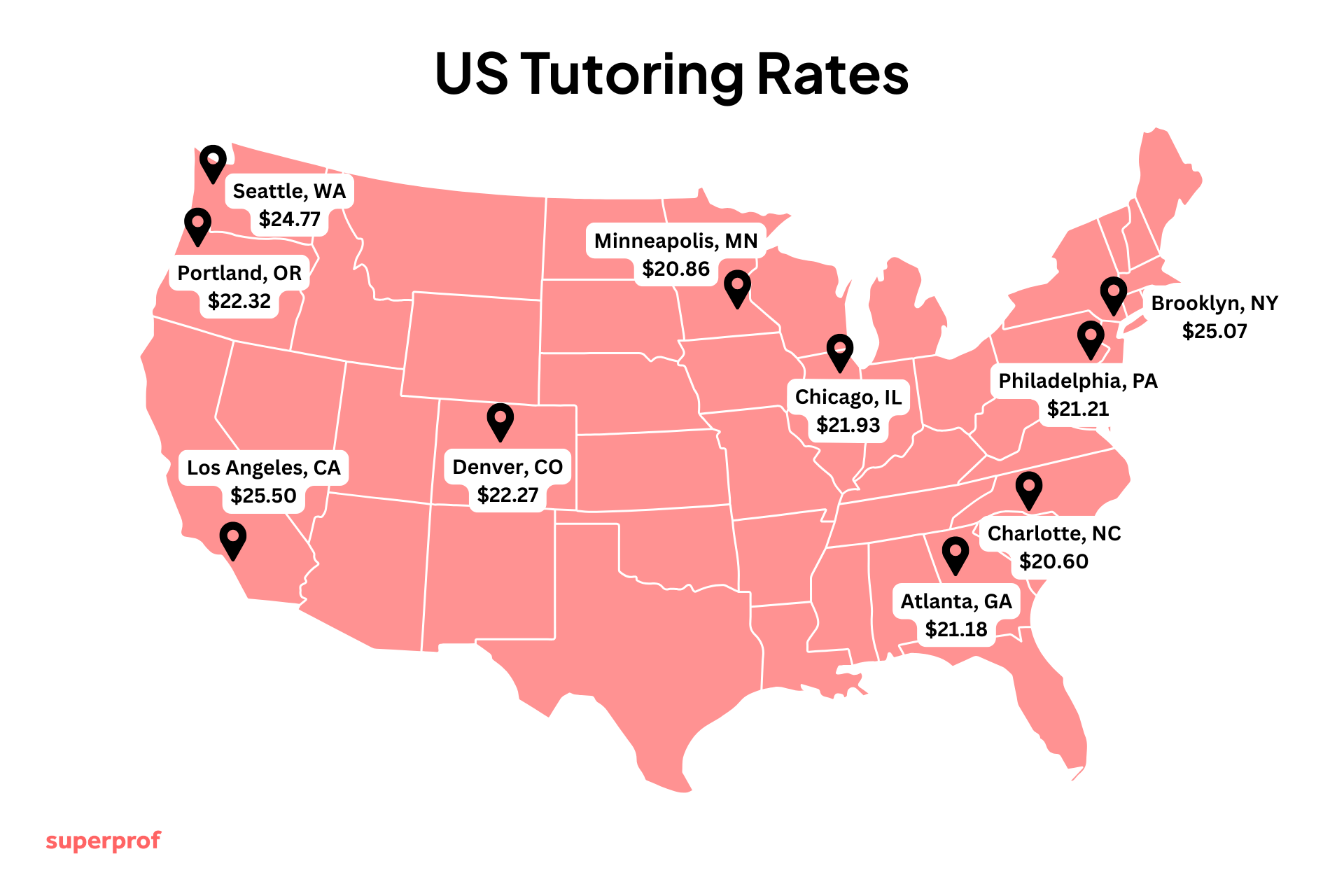One of the great things about becoming a private tutor is the freedom that you have over your life. The degree of flexibility associated with becoming a private tutor has made it an attractive option for anyone with knowledge to share and a passion for teaching. Private tutoring can also be a lucrative pursuit that’s more than financially rewarding, whether you decide to tutor on a full-time basis or earn some cash on the side. On average, most in-person tutors charge between $25 and $80 per hour, while online tutors typically charge less at $20 to $70 per hour. As you can see, all of this freedom comes at a cost, as you're going to be on your own when it comes to running all aspects of your business, from marketing your services, filing your taxes, to setting your rate. We’re here to shed some light on how to set your own tutoring rate so you can begin earning a fair wage for your service.
Want to give private lessons?
Join the Superprof community and share your knowledge with interested and motivated students.
What Are the Average Private Tutoring Rates Across the US?
The US tutoring market is expected to grow by $28.85 billion by 2029.
So, if you’re looking to capilatize on this and get a slice of the pie for yourself, then there’s a bit of a learning curve. You'll need to familiarize yourself with how the average rate that tutors charge for their services differs from one area to the next here in the US. Before we go into all of the specific factors that govern the rate that tutors can charge, let's take a look at the average tutoring rates across the US.

As you can see, there is quite a range of tutoring prices across the US. However, you'll see from our table below that the average rate for general tutoring across the US lies around $22.57. You'll want to note that the average isn't going to be the best reflection of your potential earning potential, as it's skewed by online learning and lower-level tutoring that weigh this figure down quite a bit. The average is definitely an effective tool for determining your own rate, but you should also note that tutoring rates can reach as much as $100 per hour for specialized subjects like SAT prep or tutoring for a professional qualification.

Setting the rate that you’re going to be charging your students for an hour of your time as a private tutor can be approached a lot like the process you’d follow if you were purchasing a car or a house.
Whether you have a particular number in mind already or don’t know where to start calculating a fair return for your services, you’ll need to do a bit of market research.
This will involve taking a look at the tutoring market here in the US as a whole and then refining your scope according to the area in which you currently reside.
You wouldn’t jump the gun and buy a car without first considering the going rate for the vehicle that’s captured your interest, would you? The same should be true when it comes to setting your rate as a private tutor. You’ll want to do some research about what other tutors are charging for their services, as this will give a better understanding of the landscape that you intend to compete in. For starters, private tutoring has grown substantially over the last several years. Market data shows US private tutoring costs range between $25 and $80 per hour. These rates can vary based on several factors that we’ll get into over the course of this article.
Key Factors That Influence Your Hourly Rate
📚 Subject
📍 Location
👵🏼 Experience
Okay, so you’ve looked at the tutoring market here in the US, the trajectory of where it’s heading, the demand for your skills and what tutors are charging for their services across various online tutoring platforms or in schools, what next? Well, all of this sets the stage for determining the market value for your service. Your hourly rate isn't just about time—it shows your expertise, where you work, and what educational needs you meet. In order to see how much you, in particular, can earn teaching your subject of choice, it will depend on a number of factors that can cause this figure to deviate quite a bit.
As an educational tutor, have you ever wondered how much to charge as a tutor? Well, let’s get into it:
More important than the curriculum is the question of the methods of teaching and the spirit in which the teaching is given.
Bertrand Russell, Philosopher and logician
How Subject and Grade Level Affect Pricing
From your market research, you should have some idea of the demand for the subject that you are teaching. If you are tutoring high school-level math, then the good news is that your services will always be in demand, as a new pool of students will be preparing for the subsequent exam each year. The flip side of that coin is that the high demand also comes with a considerable amount of competition from many other tutors eroding the profit margin on tutoring the subject.

If earning potential matters most to you, then you could look at tutoring STEM subjects, as tutoring in these subjects tends to cost more than others. Math and science tutors command the highest rates due to their technical expertise. As an SAT or test prep specialist, you’ll be able to set your rate at about $45 to $100 per hour. Students are inclined to spend more on subjects that will help their college or professional success than on subjects they are taking out of enjoyment or interest. Seeing as college-level tutoring begins at $60 to $70 per hour, you can begin to see why lower levels like K-12 come with a smaller paycheck. Then, even after college or university, you could look at tutoring for other qualifications.
The barriers of entry for tutoring professionals to sit their CPA exams to become a qualified accountant are considerably higher, as is the return on investment for those preparing to succeed in the assessment. For this reason, there is generally a lower tutor-to-student ratio, which drives up the cost of the service. On top of that, tutors can also charge more for their time, given the subject and level that they are tutoring at. Who would have thought the extent to which the subject influences the rate a tutor can charge would be so substantial?
When deciding on your tutoring rate, make sure to consider the price of materials that you need for each lesson.
Location
The next factor influencing the rate that you might want to charge for your tutoring service is the location in which you currently reside, or intend to teach at. If you are currently living in or intend to teach students in California or New York, then you’ll need to charge a higher price in order to keep up with the respective cost of living. The everyday expenses in these locations will be much higher than if you were living in a small town or rural area, so it’s important that your price reflects that. While this is a specific example, a good rule of thumb to go by is that cities always pay more than rural areas.
Math tutors in New York earn about $25.10 per hour, while those in Los Angeles make $25.50 per hour, and Chicago tutors get $22 per hour.
Seeing as the average salaries are also higher in these bigger cities, students and parents tend to part ways with a higher rate when it comes to tutoring. That’s why tutors in more expensive cities such as New York City and Los Angeles can ask for $100 to $200 per hour, but Midwest tutors might start at a lower rate. Your proximity to the students that you intend to tutor will also play a role in the amount of money that ends up in your pocket. If you opt to tutor in person, then you’ll also need to consider the hidden costs, such as commuting to and from each lesson.
Why Your Experience and Credentials Matter
In order to arrive at a rate for your tutoring service, you’ll need to understand what you have and leverage it in order to charge a favorable rate. On top of allowing you to earn more as a private tutor, your qualifications and credentials also do a lot of the heavy lifting when it comes to convincing students to choose to learn from you.
It shouldn’t come as much of a surprise that teachers with certification earn more because they have classroom experience and formal training.
In reality, the rarer your qualifications are and the more experience you possess in the field of scholastic support, the easier it will be to valorize your work and charge higher fees.
Those with more tutoring/teaching experience will acknowledge this, and in doing so, they will ensure that the coverage of their sessions will be reflective of how the student most effectively endorses information.

Those who already have advanced degrees in specific fields can ask for premium rates, seeing as their experience creates natural price levels. Also, if you’ve graduated from a prestigious university or Ivy League school, and are a specialist in your area, it will be easier for you to monetize yourself. On the other hand, new tutors start lower while building their reputation, but those with five or more years of experience often begin charging top rates.
Want to give private lessons?
Join the Superprof community and share your knowledge with interested and motivated students.
Freelance or Salaried?
After you’ve identified your fees and related information, it’s time to put your skills to practice. For this, two options are available to you: you can work as a freelance private instructor or as the employee of a company. Both have their benefits and advantages.
Freelance Private Tutor
The self-employed instructor is a free agent who can charge whatever price he or she wishes. They can also manage their own schedule and select their own students. Students looking to find a tutor will get in touch directly. Pull back the curtains on how to justify your hourly rate as a tutor. The more effectively you advertise your skillset, coupled with positive testimonials on your profiles, along with 5-star reviews, you will find yourself inundated with student requests.
Private Tutor in a Company
On the other hand, if you work for a company, you’ll have less freedom, but more time to devote to planning your courses, etc. That’s because they’ll handle most of the scheduling and other supplemental details for you! You won’t need to spend time looking for clients. What’s more, these types of agencies are always offering tutor jobs (even during school vacations). So, if you are looking for private tutoring jobs, you should apply. But don’t forget that the company often sets the fees and you’ll have little choice in the matter.

They will most likely take a commission per hour of courses taught. In both cases, the prices are decided in the function based on the student’s level. Your payment wouldn’t be the same for homework support in an elementary school, exam prep in high school and an intensive language course in night school, for instance. Some schools also have tutoring programs that offer one-to-one lessons. So, instead of working as a home tutor or in tutoring centers, the tutor meets the learner in a school setting.
Get the Best Rate for Your Services with Superprof
What better place than Superprof, a platform for online tutoring with so many talented instructors in a vast range of topics and disciplines, to begin the journey? There’s no need to follow an expensive and time-consuming certificate course (although it can help to be a certified teacher): this article will allow you to brush up on some key points, and learn the main secrets of the trade of one on one tutoring (or small group tutoring) and academic success.
You can also enroll for free on Superprof in order to be put in touch with your future students in private tutoring! As you may already know, Superprof is an international platform exclusively dedicated to private courses and allows students and instructors to establish a close, confident relationship thanks to a system of certified testimonials and verified profiles. Students in your location and beyond will be able to browse your tutoring profile when they search for lessons in your subject. They will instantly get a sense of your teaching style and background from the bio you include on your profile and the reviews left by past students. Not only will the tutoring on the platform add to the demand for your tutoring service with the pool of students that use Superprof on a daily basis, but it will also help students see that your expertise warrants the rate that you charge. Sign up today and begin tutoring students in your respective subject or skill via webcam or in person.
References
- Tutors.com. “How Much Does a Tutor Cost?” Tutors.com, https://tutors.com/costs/.
- Care.com. “How Much Does a Tutor Cost?” Care.com, https://www.care.com/c/how-much-does-a-tutor-cost/.
- Care.com. “How Much to Charge for Tutoring?” Care.com, https://www.care.com/c/how-much-to-charge-for-tutoring/.
- Full Mind Learning. “How Much Does a Tutor Cost?” Full Mind Learning Blog, https://www.fullmindlearning.com/blog/how-much-a-tutor-costs.
- Tutor Cruncher. “Average Tutoring Rates.” Tutor Cruncher Blog, https://tutorcruncher.com/blog/average-tutoring-rates.
Want to give private lessons?
Join the Superprof community and share your knowledge with interested and motivated students.
Summarize with AI:















